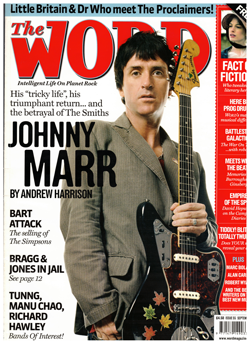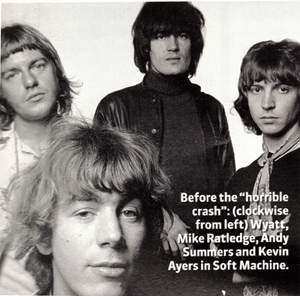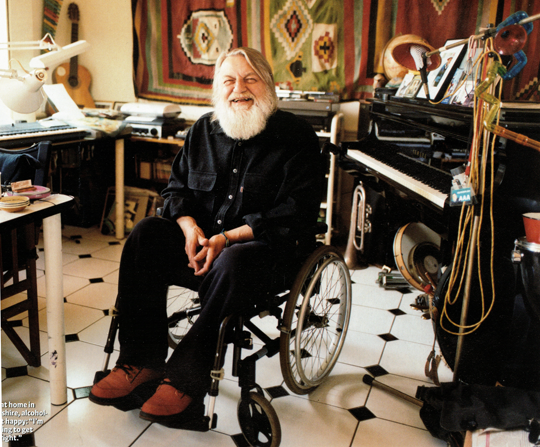| |
|
|
 “Sing like you speak” - The Word - n°55 - september 2007 “Sing like you speak” - The Word - n°55 - september 2007
|

|
"SING LIKE YOU SPEAK"
Unimpeachable vocalist, jazz journeyman, storm-tossed philosopher and political sage, Robert Wyatt looks back at what life has taught him
INTERVIEW BY TOBY MANNING
PORTRAIT BY MUIR VIDLER
ROBERT WYATT is BOTH A disarmingly ordinary bloke and a figure of extraordinary charisma. Not many interviewees include Richard Dawkins, Kropotkin and Benjamin Britten in their discourse; fewer still ring you up afterwards to check you got home safely.
The son of liberal parents, Wyatt left school at 16, because "I was fed up of being caned. I'd no ideological objection - it just fucking hurt." He became the drummer and singer of progressive jazz voyagers Soft Machine, lords of misrule of London's psychedelic revels. Wyatt was the Softs' heart and soul. With his Kentish vowels, forlorn falsetto and conversational lyrics, he was a deliberate antidote to countercultural whimsy. He describes being kicked out of the band as one of the most painful experiences of his life. As painful as the drunken fall from a window in 1973 that brought his drumming career to an abrupt halt and has consigned him to a wheelchair ever since. Back broken, spirit anything but, Wyatt married artist Alfreda Benge, who became his cover artist, manager, and - since 1991's Dondestan - co-lyricist. His work took on new energy, from 1974's Rock Bottom through unlikely hits I'm A Believer and Elvis Costello's Shipbuilding right up to his forthcoming, magically eccentric Comicopera - a wonderful body of work. He's also pursued an astonishing array of collaborations: who else could get Brian Eno and Paul Weller into the same studio?
"Exiled" in a delightful market town in Lincolnshire, in a Bohemian house stuffed with art, percussion instruments and jazz records, Wyatt has only very recently given up alcohol,
and says ruefully, "It's very hard to write sober. Sundown's the difficult thing. What are you going to do? Have another cup of tea?"
Well in this case, yes. Alongside a roll-up, a pensive tug of his Lenin beard, and the offer of his wisdom for THE WORD.
"NEVER PRESUME"
"Presumption is the biggest cause of human traffic accidents. Never assume you know what's going on in someone else's mind. Because as far as I can see no one knows why we're here at all, so we all have to invent a reason and everyone will have invented a slightly different one. Even if a relationship has a name like son, daughter, wife, that doesn't give you the right to trample over each others' private dreams and fantasies. Treat other people's minds with respect. Even your nearest and dearest have a silent solitary part of themselves that's as inviolable to you as if they were a complete stranger."
"LOVE IS THE BRAKE TO YOUTH'S RECKLESSNESS"
"As a young man I lived rather recklessly and just about half got away with it. I say only half obviously 'cos I'm in a wheelchair. One of the corollaries to thinking I'd have been quite happy not being born is that the concept of danger changes completely. The only enemy becomes boredom. And the only limits to what you do about that are an education - and I'd like to think, via Kropotkin [Russian anarcho-communist], an inner desire to not cause harm to other people. Whereas I'm quite likely to - and indeed did - jump out of a window just to see what it was like, I don't think I'd have ever pushed anybody else out of a window. Because it might not have suited them as an activity.
"Did I jump or fall? Well, I was so drunk... But it's not kind of normal, is it, climbing on to a window ledge. But I didn't give up drinking afterwards. The thought that I might drink myself to death seemed a good way to go. I've never been interested in my health. I'm very touched that someone else wants me to keep healthy for as long as possible and as that's as good a motive as any I could cook up for myself. Alfie tends to guide me from obvious harm. So out of respect for that I try to look after myself.
"I've been more at ease since I've been in a wheelchair and more clear what on earth to do with myself than I was before. It coincided with marrying Alfie - maybe it was just that that was the just right team I needed all along rather than being in the testosterone-fuelled nightmare of an avant-garde boy band. So when I hit rock bottom, it was anything but rock bottom - it was like being washed up on a really nice desert island. With me and my mate. And it was a pleasant surprise that the kind of people who previously regarded long-haired jazzers with suspicion and hostility suddenly started treating me with courtesy and consideration - I made a smooth transition to a kind of Winnie the Pooh-like harmlessness, which disarmed hostility all around me.
"I'm perfectly alright in a wheelchair. I find it...interesting. It's another place to be. I had 28 years as a biped. I've had much longer now in a wheelchair. And apart from my childhood I've never really been happier than I am now."
"SING LIKE YOU SPEAK"
"Songs work best when they seem to resonate with conversational patterns. You go back to Ogden Nash and Noel Coward and find kindred spirits. My goodness what a beautiful voice Noel Coward has got - and utterly and totally English. I extended the same thing to lyric writing. I prefer to use phrases I would use anyway. One of the Englishnesses I was brought up on was Edward Lear, Hilaire Belloc and Lewis Carroll. Gobbledegook. That sort of game is also part of what I draw on - before conscious thought. Dada too, of course, follows straight on. The surrealists said do an intellect bypass and get straight to what's going on in the head without monitoring it."
"RULES ARE PRACTICAL, NOT MORAL"
"It's been a very great preoccupation of the extreme right to establish the existence of evil: they think the trouble with liberal thinking is that comparative moralities give people no guidance. So I say call it evil then, but then what? If someone's actually born evil, wouldn't that mean they'd be completely blameless? To make murder illegal is just a practical issue, like driving on a certain side of the road. That's not a moral question, it's practical."
"BEING MARRIED TO A TOURING ROCK MUSICIAN IS LIKE BEING MARRIED TO A SAILOR"
"I was not a conscientious father. I put my music and drumming first. And it's not at all surprising that someone took over [fellow bury drummer Pip Pyle married Wyatt's first wife Pam, bringing up his son, Sam]. And as far as I know there's no ill feeling among any of us. "I've been punished, it's that Sam doesn't have anything in common with me in terms of cultural pursuits. But we love each to death.
"Shared tastes have nothing to do with empathy. As a youth I remember voluntarily ghettoising myself into various gangs, whether it was avant garde or jazz or the new rock and roll, and getting terribly het up if people didn't want to heart Stockhausen. But some of the nicest people I know never listen to anything apart from Gilbert and Sullivan, and I know some people with terrific taste whose behaviour strikes me as really misanthropic. »
“I was wheeling through Soho Square, early on in my wheelchair. And I slipped out of the chair right forward into the road into the traffic. A lot of people ignored it, but one bloke ran across from the other side of the road, picked me up, helped Alfie get me back in the chair and disappeared into the night. I didn't say, “You look like a jazz musician, but if you only like country and western then I don't want your help.' Kindness can't be legislated."
"RECORDS ARE LIKE FADING TATTOOS"
"My biggest influence is records I don't like. Including my own. It's a bit like if you have tattoos saying I Love Ann. Then she dumps you a month later and you're going out with Mandy. You think, 'If I add an M and a Y...' and it all gets a bit scratchy. Records are like fading tattoos. They're eradicable more or less, and if you knew that when you were making them you'd have been much more circumspect.
"Writing lyrics is one thing, writing tunes another, singing songs another. I try to do each one as well as if it was the only thing I did. But I find it a challenge to get all three in one place for three or four minutes, and if my words won't fit the music I don't use them. I like not to be able to spot the join. I can sometimes tell with Joni Mitchell that there was a bunch of lyrics here and the music came after. It's even worse with Benjamin Britten - phenomenal musical ideas, but too much recitative! It's hard work
- I don't listen to verbal narrative with the same brain muscles as I fall into music."
"THE PAST IS A REFERENCE POINT FOR WHAT NOT TO REPEAT"
"For a long time my biggest regret - apart from being born, I wouldn't have done that if I'd thought it through beforehand! - was going to school in East Kent and meeting the Soft Machine guys. For a long time afterwards it felt like a complete waste of time. It's like a train journey - you can't think of it without thinking of the horrible crash that ended it. But I'm glad I'm not nostalgic, because I find some people sort of trapped in nostalgia. I'm still trying to get things right. Just an hour's music that I wouldn't change. I don't think I'll ever manage it, but it's an exercise that's taken up most of my life. The past is a useful reference point for what not to do again."
COMICOPERA is out on October 8 on Domino
|




